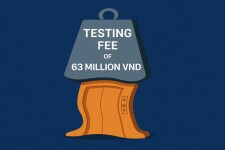The seminar "Improving the quality of human resources in Vietnam elevator industry" was a great success with the high appreciation of the state management agencies, scientists, the business community and attracted a lot of attention. The question is when will we realize key solutions such as building the National Occupational Skills Standards, issuing training codes in the vocational education system, and standardizing human resources?
Deputy Minister of Labor, Invalids and Social Affairs Le Van Thanh stated that in the past time, there have been many tragic accidents causing damage to both people and property due to the operation and use of elevators, escalator. This has been posing problems not only in terms of elevator quality management but also state management of jobs that directly affect the health of workers or the community. These require workers to have a national vocational skill certificate according to the provisions of the Employment Law 2013 for production, business and service activities in the field of elevators, escalators, Deputy Minister Le Van Thanh emphasized.

For the first time, the key issues to improve the quality of human resources of elevator industry is discussed and commented frankly
According to Mr. Vu Tien Thanh, Head of Occupational Safety Inspection and Standards Department, Department of Labor Safety, Ministry of Labour, Invalids and Social Affairs, there are currently nearly 400 enterprises manufacturing, importing and supplying elevators, but only 13 unit has registered to announce the regulation conformity. Every year, Vietnam imports over 6000 elevators and 1.7 million elevator components. With such potential of the market, the supply of high-quality human resources should be carried out methodically, professionally and appropriately, but so far this has not been done.

A representative of the Department of Occupational Safety said that there are no occupational skills standards for the elevator industry is a huge challenge
A representative of the Department of Occupational Safety assessed that establishments in the vocational education system still lack specialized training modules on elevator design and manufacture at university, college and vocational intermediate levels. Elevator technical human resources are currently mainly trained at enterprises according to production requirements, or are the product of a combination of training between a number of schools and elevator manufacturing enterprises, on a limited scale

Dr. Pham Xuan Khanh participated in the discussion session
According to Dr. Pham Xuan Khanh, Chairman of the Council of Hanoi High-Tech Vocational College frankly stated the reality, in order to serve their operations, elevator enterprises must recruit graduates of majors such as electricity, electronics, automatic control, mechanics, construction, engines, etc., and then train more in-depth knowledge in both theory and practice about elevators. However, these short-term courses are only implemented at the company in a relatively narrow range because they are not licensed and have not been standardized.
The self-training of human resources of enterprises without being licensed is a barrier that makes it difficult for elevator human resources to be standardized and recognized. While in order to be licensed for training, you must meet the quality assurance conditions (programs, curricula, teaching staff, facilities, equipment and facilities) and register with the authorities...
Ms. Ingrid Christensen - Director of the International Labor Organization in Vietnam ILO (The International Labor Organization) has very practical suggestions in training human resources in general and elevator technical personnel in particular. According to her, Vietnamese enterprises often have difficulty in finding qualified technicians. As a result, they are often confused in hiring, often due to a lack of qualified candidates.

Ms. Ingrid Christensen talks to reporter of Elevator Magazine
The fact that most of the human resources lack skills may partly indicate that technical vocational training schools are not able to provide sufficient skills for students to meet the requirements of enterprises. The elevator industry is no exception to this, workers in the elevator industry need to be professionally trained and the curriculum must be well designed to meet the needs of daily work.
According to the Director of Vietnam ILO, the most important thing is to know which skills are needed now and which are needed in the future, be it 5, 10 or 20 years from now. We should discuss with vocational schools to agree on the program and goal of training highly skilled human resources.
After analyzing the situation, many suggestions have been raised by management agencies, professional associations, experts and businesses and received positive feedback.
The representative of the Department of Occupational Safety proposed to urgently set up a system of training, assessment and improvement of the professional quality of the workforce in the field of elevators.

Dr. Nguyen Duc Hanh, Director of the Institute of Elevator Application Engineering attended the Conference "Improving the quality of human resources in Vietnam elevator industry"
Mr. Nguyen Quoc Hiep - Chairman of Vietnam Association of Construction Contractors wondered, home buyers often ask the first question is the capacity, speed and brand of the elevator. Therefore, it can be said that the elevator industry has become very necessary and important. Accompanying such products requires well-trained personnel. Unfortunately, there is no training code for this industry.

Chairman of Vietnam Association of Construction Contractors Nguyen Quoc Hiep speaks at the Conference
Mr. Hiep suggested that it is essential to standardize elevator skills and have elevator training codes. "From the perspective of the Vietnam Contractors Association, we would like to fully support the above two solutions and suggest that the Ministry of Labor, Invalids and Social Affairs and relevant authorities should soon proceed," Mr. Hiep emphasized.
Assoc. Dr. Nguyen Thi Viet Huong - Deputy Director General of the General Department of Vocational Education, Ministry of Labour, Invalids and Social Affairs supports the need to have a training industry code and standardize vocational skills. Assoc. Dr. Viet Huong said that, in terms of procedures, documents, roadmap and steps to demonstrate implementation conditions, the General Department's leaders have assigned specialized units to implement. “It shows that the responsibility of the Ministry is very high in that it has assigned two specialized departments to directly solve this problem, the Department of Formal Training and the Department of Vocational Skills. The two units will support the Association in procedures”, the Deputy General Director affirmed her commitment to action.

Assoc. Dr. Nguyen Thi Viet Huong – Deputy Director General of the General Department of Vocational Education Ministry of Labour, Invalids and Social Affairs
Sharing the same opinion, the participants in the conference highly agreed with the proposals made from the synthesis of opinions of experts, scholars, representatives of schools, businesses, etc. towards the granting of a certificate industry code, soon there is a National Occupational Skills Standards to standardize occupational skills for workers in the elevator industry.





